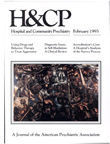Patient Dumping, COBRA, and the Public Psychiatric Hospital
Abstract
Serious clinical and risk management problems arise when indigent patients with acute medical conditions are transferred from general medical hospitals or emergency departments to public psychiatric hospitals that are ill equipped to provide medical care. To combat such practices, referred to as dumping, Congress included measures in the Consolidated Omnibus Budget Reconciliation Act of 1985 (COBRA) prohibiting such transfers. Because physicians ad administrators in public psychiatric hospitals are generally not aware oftbe potential usefulness of COBRA in reducing dumping, this paper describes its important provisions. The key to preventing dumping is to educate referral sources to limitations on the medical care available at the receiving hospital ad to discourage negligent patient transfers by enforcing COBRA. Public hospital staff ad legal counsel who become familiar with COBRA's provisions can develop an antidumping strategy.
Access content
To read the fulltext, please use one of the options below to sign in or purchase access.- Personal login
- Institutional Login
- Sign in via OpenAthens
- Register for access
-
Please login/register if you wish to pair your device and check access availability.
Not a subscriber?
PsychiatryOnline subscription options offer access to the DSM-5 library, books, journals, CME, and patient resources. This all-in-one virtual library provides psychiatrists and mental health professionals with key resources for diagnosis, treatment, research, and professional development.
Need more help? PsychiatryOnline Customer Service may be reached by emailing [email protected] or by calling 800-368-5777 (in the U.S.) or 703-907-7322 (outside the U.S.).



